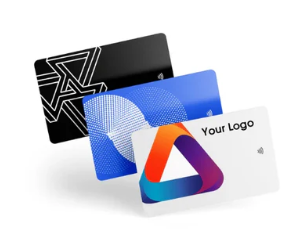
NFC-enabled digital business cards are revolutionizing the way professionals share their contact information. These cards leverage modern technology to facilitate swift and efficient networking by allowing contact details to be exchanged with just a tap. Individuals and businesses who prioritize convenience can share contact information instantly and seamlessly using a Wave Connect digital business card or NFC-enabled alternative business digital cards, which eliminates the need for physical cards. This solution not only simplifies networking but also decreases the environmental impact of traditional paper cards.
Despite their advantages, such as eliminating paper use and providing real-time updates to contacts, NFC digital business cards do come with drawbacks. They can be more expensive to produce compared to traditional paper cards and may offer limited design customization. It’s essential to weigh the benefits of instantaneous, accurate information sharing against these potential downsides.
Key Takeaways
- NFC digital business cards are quick and eco-friendly
- They may have higher costs and limited design options
- Consider if the benefits align with your networking needs
Advantages of NFC-Enabled Digital Business Cards
NFC-enabled digital business cards offer numerous benefits, such as streamlined networking, enhanced customization, and a sustainable alternative to traditional options. These features make them an appealing choice for modern professionals and businesses looking to stay ahead especially as many are now searching for the best NFC business cards in 2026 to maximize efficiency and modernize their networking approach.
Streamlining Networking with NFC Technology
NFC technology simplifies the exchange of contact information. By merely tapping an NFC-enabled device, users can instantaneously share their details. This convenience eliminates the need for physical cards, reducing the chance of lost or misplaced contacts.
Moreover, NFC business cards can also provide links to social media profiles or websites, enhancing connectivity. This rapid and efficient exchange of information can significantly improve networking experiences at events, meetings, and conferences.
Enhancing Customization and Functionality
NFC-enabled digital business cards allow impressive customization. Users can embed various types of multimedia content, such as videos, images, and links to landing pages. This interactive capability makes the cards much more engaging compared to traditional paper business cards.
Customization options extend to functionality as well. These cards can facilitate direct scheduling of meetings, navigation to specific webpage URLs, and even track engagement. Whether you’re embracing digital formats or exploring high-quality business card printing in Australia, the goal is the same—creating a versatile tool that boosts your business outreach and leaves a lasting impression. This level of interaction and functionality makes NFC business cards a versatile tool for business outreach.
Promoting Environmental Sustainability
The adoption of NFC business cards promotes environmental sustainability. These digital cards reduce paper consumption, offering an eco-friendly alternative to traditional business cards, which often contribute to significant paper waste.
Additionally, NFC cards are reusable and can be updated digitally, making them a more sustainable choice. This approach aligns with increasing global awareness and efforts toward reducing environmental impact, making NFC-enabled digital business cards a thoughtful choice for the eco-conscious professional.
Disadvantages of NFC-Enabled Digital Business Cards
NFC-enabled digital business cards offer modern convenience but they come with some drawbacks. These include financial implications, compatibility issues, and potential security risks.
Considering the Financial Implications
NFC business cards are typically more expensive to produce than traditional paper cards. Costs can add up quickly, especially for businesses with a large number of employees who need these cards. Unlike standard paper or plastic cards, the integration of an NFC chip increases the price due to its advanced technology.
The initial investment for companies might seem cost-effective long-term, but it can strain budgets initially. Additionally, replacing damaged or lost NFC cards also incurs higher costs compared to paper cards. This pricier option may not align well with tight marketing budgets or for small businesses considering various networking strategies.
Addressing Compatibility and Accessibility Issues
Compatibility with NFC technology can be another significant issue. Not all smartphones and devices support NFC, creating potential accessibility problems. If a recipient’s phone lacks an NFC chip, they cannot access the digital business card’s information through a simple tap. In such cases, traditional identification methods remain effective; for instance, Custom Lanyard offers durable PVC ID cards that ensure seamless information sharing without relying on device compatibility.
While most newer smartphones include NFC capabilities, older models and certain budget devices might not. Users must also ensure their NFC-enabled devices are set up correctly to interact with the digital business card. This creates an added hurdle, possibly leading to missed opportunities if the technology fails during a crucial moment.
Analyzing Security and Privacy Concerns
Security risks are a notable concern regarding NFC-enabled digital business cards. The wireless transmission of data inherent to NFC technology introduces vulnerabilities. Unauthorized parties could potentially intercept the data during contactless sharing, posing security threats.
Although many NFC business cards utilize encryption and secure protocols, risks still exist. The potential for data breaches or misuse of shared information can make users wary. Malware and other forms of digital attacks could exploit unreliable security measures, further compromising the integrity of the shared content. Users must weigh the convenience against potential privacy issues when opting for NFC business cards.
Conclusion
NFC-enabled digital business cards offer a modern, efficient way to exchange contact information. Their ease of sharingand environmental benefits make them a compelling choice.
However, their higher production costs may be a consideration for larger networks. Overall, NFC technology represents a significant step forward in business communications, balancing convenience and sustainability.





